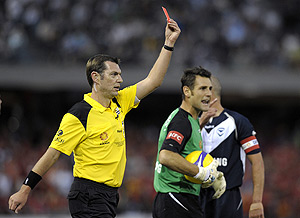Controversy as Villa keeper handed second yellow for shootout crowd taunting... but isn't sent off
Emi Martinez was saved by a new rule that resets yellow cards at the end of extra time, meaning his second yellow for taunting…

The referee holds up a red card to send Christiano of Adelaide United from the field at the Grand Final of the A League Soccer at the Telstradome in Melbourne, Saturday, Feb. 28, 2009. AAP Image/Martin Philbey
What to make of another tumultuous round of A-League action? There’ll be plenty of column inches devoted to dwindling attendance figures, while the thorny of issue of refereeing has once again hit the headlines.
It seems we can’t go long in the A-League without refereeing standards coming into question.
Last season’s Grand Final was marred by an early dismissal, and the cards are flowing freely once again as we settle into the new campaign.
We recently saw Shane Smeltz handed an early bath for giving the assistant referee “a Marcel Marceau” – as Fox commentator Andy Harper labelled it – in Gold Coast’s shock Round 7 defeat to the Central Coast Mariners.
Now referee Peter Green has assumed the spotlight following his controversial decision to allow Melbourne Victory to retake a penalty for encroachment in last weekend’s 3-2 win over the Gold Coast.
Kevin Muscat skied his first effort, as we all know, but stepped up to slot home at the second attempt.
That prompted a predictable outburst from Gold Coast’s bullish benefactor Clive Palmer – who, strangely enough, responded by paying United players a win bonus.
I’m not sure Palmer would pay his resident yacht builder a bonus should his latest schooner sink like a stone to the bottom of the Gold Coast Seaway, but you can nevertheless understand his frustration.
After all, it’s Palmer who puts his money on the line, and he will have been as irate as anyone after seeing United battle for over an hour with ten men following the dismissal of Steve Fitzsimmons, only to come away empty-handed.
As much as I can empathise with Palmer, at least in this instance, and as much as Green’s decision to allow Muscat to re-take the spot-kick looked harsh, I don’t think our man in the middle deserves public condemnation.
After all, it’s the remit of A-League referees to apply the letter of the law – something Green clearly felt he was doing.
That said, it’s true that our refereeing standards could be improved.
However, having spent considerable time in Japan – where inexplicable decision-making seems to be somewhat of an art form – I personally think things could be a lot worse.
Former English Premier League referee Alan Wilkie’s recent assessment of J. League whistle-blowers was measured compared to some of the terrace antics that accompany poor officiating.
I’ll never forget referee Minoru Tojo trudging stoically from the field, police protection in tow, as furious Shimizu fans rained down beer cans on the hapless official following another diabolical refereeing display in a 1-1 draw with Omiya.
But while Japanese referees struggle with the relationship between deference to authority and the need to communicate with players, they are at least employed in a full-time capacity.
That’s not something that A-League referees can claim, and it’s an issue that should be high on the FFA’s agenda.
Considered by many to be the country’s top referee, Ben Williams recently revealed that he is forced to sacrifice potential earnings just to officiate in the A-League.
It’s easy enough for players and coaches to snipe at A-League referees, but they do so on the back of generous pay packets commanded in a relatively secure job market.
If A-League referees were allowed to concentrate on the job full-time, it might be the first step towards improving standards of officiating in this country.
Otherwise, we may just have to accept the fact that the age-old adage is true: referees are only human.
Like tax collectors and ticket inspectors, they may be easy to dislike.
But without them we wouldn’t have a game – or at least one judged in a fair and impartial manner – and for that reason I’ll take the odd error of judgement over any potential for a football-free weekend.